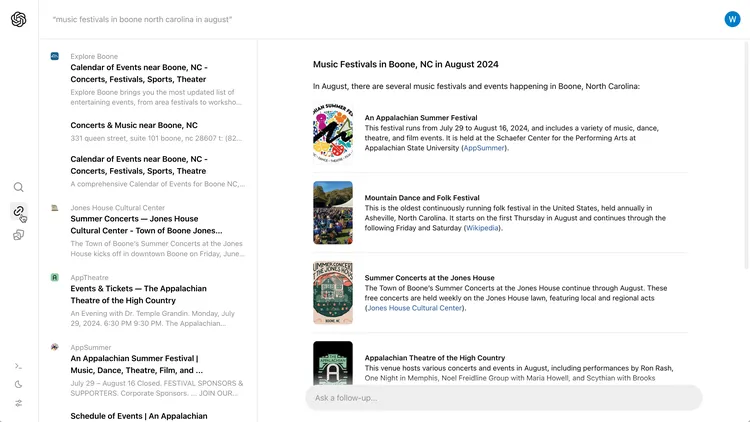OpenAI, the company renowned for its innovative AI solutions, has launched a groundbreaking search engine prototype, SearchGPT.
This ambitious move positions OpenAI as a significant contender in the online search market, traditionally dominated by Google. The launch of SearchGPT represents a notable shift in the landscape of search technologies and brings with it a plethora of potential business impacts.
Open AI Newsroom, July 2024
“We’re testing SearchGPT, a prototype of new search features designed to combine the strength of our AI models with information from the web to give you fast and timely answers with clear and relevant sources.
We’re launching to a small group of users and publishers to get feedback. While this prototype is temporary, we plan to integrate the best of these features directly into ChatGPT in the future. If you’re interested in trying the prototype, sign up for the waitlist.”
Shares in Google’s parent company, Alphabet, ended the day down nearly 3% following the announcement.
Evolution of Search Technology
SearchGPT integrates real-time information retrieval with the conversational capabilities of OpenAI’s ChatGPT. This approach aims to streamline the search process, offering users faster and more accurate answers to their queries. Instead of presenting a list of links, SearchGPT provides conversational responses, summarising information and including relevant sources. This innovation could revolutionise how users interact with search engines, making information retrieval more intuitive and user-friendly.
Competitive Edge in the Search Market
OpenAI’s entry into the search market challenges Google’s long-standing dominance. While Google currently controls over 90% of the market, the introduction of a sophisticated AI-powered search engine like SearchGPT could erode this dominance in time.
Businesses that rely heavily on Google’s search algorithms for visibility may need to adapt their strategies to ensure they remain competitive as search behaviour continues to evolve. This shift could lead to increased investment in AI-driven SEO techniques and a broader diversification of digital marketing efforts.
Implications for Advertising Revenue
Search engines generate significant revenue from advertisements. Google’s model, which prioritises ad placements within search results, has been highly lucrative.
However, SearchGPT’s approach of delivering conversational answers with embedded links may disrupt this model. Advertisers might need to rethink their strategies, focusing more on content integration within AI responses rather than traditional ad placements. This shift could lead to new forms of advertising, such as sponsored answers or premium content highlights within AI-generated summaries.
Impact on Media and Publishing Industries
One of the most contentious issues surrounding AI in search technology is the use of copyrighted content. Many publishers have raised concerns about AI models training on their material without consent, potentially leading to revenue loss as users obtain information directly from AI summaries rather than visiting original sources.
OpenAI has addressed these concerns by partnering with publishers and offering them control over how their content appears in search results. This approach could set a new standard for collaboration between AI companies and content creators, ensuring fair use and compensation for original content.
Cash Rules Everything Around Open AI
OpenAI’s swift progress has attracted millions of users to ChatGPT, yet the financial burden is increasing. According to reports, the expenses for AI training and inference could climb to $7 billion this year, exacerbated by the high number of free ChatGPT users.
These costs are primarily driven by the substantial computational power required to support and continuously improve the AI models. The free version of ChatGPT, while instrumental in building a vast user base and gathering valuable data, significantly contributes to these escalating expenses.
Given these financial dynamics, OpenAI will need to devise a robust monetisation strategy soon. Potential avenues could include introducing premium features or subscription models for advanced functionalities. It might follow Google’s lead, in time, integrating targeted advertisements in a user-friendly manner, balancing the need for revenue with a seamless user experience.
Additionally, OpenAI could explore partnerships and licensing agreements with other companies, leveraging its advanced AI capabilities to provide customised solutions and services. For instance, it recently announced a new partnership with Apple.
The need for a sustainable revenue model is crucial not only for covering the operational and developmental costs but also for ensuring long-term viability and continued innovation. As OpenAI expands its product offerings and user base, finding the right balance between free access and paid services will be essential. This balance will help maintain user engagement while securing the necessary funds to support the company’s ambitious goals and ongoing advancements in AI technology.




RECOMMENDED FOR YOU
Meta Expands Opportunity Score Globally
Meta is expanding the availability of Opportunity Score in…
Meta is expanding the availability of Opportunity Score in…
Google CTR Drops as AI Overviews Dominate
One year after the launch of Google’s AI Overviews,…
One year after the launch of Google’s AI Overviews,…
Google Expands AI Mode to Boost Search Discovery
Google is stepping up its AI game with the…
Google is stepping up its AI game with the…